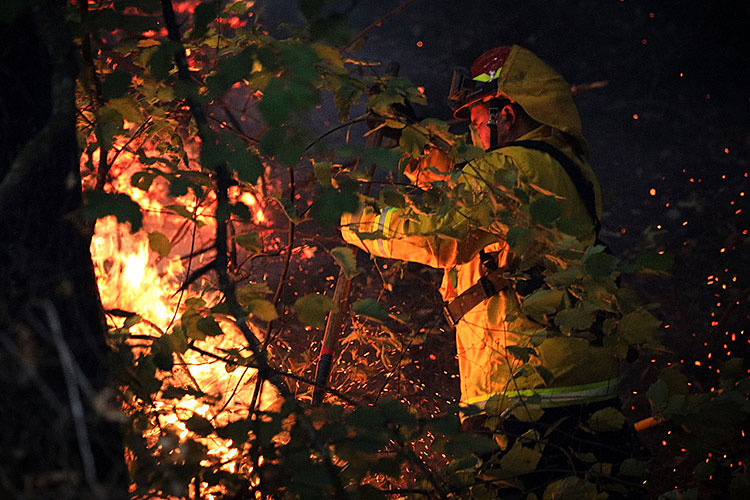The Santa Cruz County Grand Jury’s June report “The CZU…Fire–Learn…or Burn?” was critical of the Santa Cruz County Board of Supervisors’ oversight after the 2020 wildfire burned 86,000 acres and desotryed more than 900 homes.
 Here are the Grand Jury findings and recommendations, with responses from the Board of Supervisors:
Here are the Grand Jury findings and recommendations, with responses from the Board of Supervisors:
- The Board of Supervisors did not adequately respond to their constituents’ concerns and questions.
DISAGREE: The Board established the Office of Response, Recovery and Resilience(OR3) in the County Administrative Office (CAO).
The new OR3 is tasked with coordination of the County’s recovery efforts to the CZU August Lightning Complex Fire, readiness and response preparations to future disasters and to increase resiliency of the County overall in response to climate change.
![]() At the Board’s direction, prior to the establishment of the OR3, the County deployed an interdepartmental fire recovery team consisting of representatives from the Planning, Public Works, Human Services, and County Administrative Office Departments, and the Health Services Agency Environmental Health Division to support efforts to rebuild, recover, and increase resilience.
At the Board’s direction, prior to the establishment of the OR3, the County deployed an interdepartmental fire recovery team consisting of representatives from the Planning, Public Works, Human Services, and County Administrative Office Departments, and the Health Services Agency Environmental Health Division to support efforts to rebuild, recover, and increase resilience.
Additionally, the County created a single email address that fire survivors could use to help streamline their recovery related questions and ensure prompt appropriate responses.
In October 2020, the Board of Supervisors designated Supervisors Bruce McPherson and Ryan Coonerty to serve as an ad hoc committee to monitor and oversee the implementation of the County’s recovery and resilience efforts. They serve in this capacity to ensure the County is addressing the concerns and questions raised during the recovery process for fire survivors.
County staff, the Board of Supervisors, and its representatives from each district remain available to hear concerns and continue to address issues raised by County residents on an ongoing basis.
Supervisors McPherson and Coonerty also hosted numerous community meetings virtually to provide updates to the community, including taking questions regarding recovery, debris flow risk and other topics.
The OR3 is engaged in constituent support for fire recovery and has developed a monthly newsletter and website to disseminate important and timely information to concerned stakeholders.
- The Board of Supervisors has not held Cal Fire accountable for their lack of analysis of their performance in the CZU Lightning Complex fire.
DISAGREE: The CZU Lightning Complex Fire was unprecedented in its scope and complexity. Many residents are understandably distressed.
While the County contracts with CalFire for local fire protection and Emergency Medical Services in local unincorporated areas, CalFire is a State agency independent of County oversight. The fire was classified as a State Responsibility Area fire and CalFire responded to the incident through this larger State role.
County Fire resources were deployed in response to the incident and the County can request a local review of County resources deployed.
CalFire has published a report titled, 2020 Fire Siege, documenting the Statewide response to the 2020 fire season, which is available online.
- No provision exists in the current contract between the county and Cal Fire to develop after-action reports during the non-fire season.
AGREE: CalFire, as County Fire has participated in County after action reviews and participates in monthly coordination meetings with law enforcement, CAO, and the OR3.
Additionally, CalFire is active in leading evacuation planning efforts.
CalFire is an engaged partner, and remains so, despite the significant pressure of recent significant fire seasons.
After action reviews and transparency are best practices for all responding agencies. The County can explore incorporation of after-action reviews into future agreements with CalFire.
- The Board of Supervisors’ responses to the Findings and Recommendations of the 2020 Ready? Aim? Fire! report show a lack of engagement with the material and a lack of understanding of their role as advocates for the county.
DISAGREE: The Board responded to the report with accurate information and strongly advocates for its residents.
The Board, through County staff, has created the OR3, is seeking new grant funding opportunities, and is working with the Resource Conservation District and Fire Safe Council on strategic planning, grant development, and capacity building.
Additionally, OR3 and Planning Department staff went before the State Board of Forestry to advocate that no State regulatory changes impede the ability of CZU survivors to rebuild.
- The adequacy of resources for firefighting in the future is questioned due to uncertainty of mutual aid assistance, deployment and management of volunteer companies, and availability of funding.
AGREE: The mutual aid response from local partners was exemplary. At the time of this incident, many other incidents were active concurrently, creating competition for mutual aid resources.
Statewide mutual aid has experienced challenges due to the magnitude, scope, and duration of the mutual aid requests being received.
Volunteer staffing is strained locally, statewide, and at the national level as a result of the high standards necessary to certify volunteer firefighters.
Changing weather patterns have created a need for more adaptive approaches.
The State, in response to this changing environment, has allocated $25 million for prepositioning fire resources in anticipation of incidents
•••
Recommendations
- In the next 30 days the Board of Supervisors should conduct an investigation to challenge Cal Fire on their preparation for future fire events, Cal Fire’s response to the CZU Complex Fire, and give satisfactory answers to all residents’ questions and concernsas documented in this report.
WILL NOT BE IMPLEMENTED: The County Fire Chiefs Association met to discuss lessons learned and continue to meet and work together. Substantive concerns at the State level are outside the local span of control to address.
County Fire and its State CalFire partners provided a professional response under considerable strain from the magnitude of this incident.
The County will continue to partner with CalFire and community-based organizations to prepare for future fire incidents within Santa Cruz County.
- In the next six months the Board of Supervisors should adopt a formal policy for handling and logging resident complaints and requests for information.
WILL NOT BE IMPLEMENTED: Each Board of Supervisors district has their own process for logging resident complaints and requests for information.
Additionally, each County department has a process for receiving and responding to resident concerns.
Residents may also request information through the Public Records Act process, voice concerns via Board of Supervisors meetings, and use of the Whistleblower Hotline.
- Within the next six months, the Board of Supervisors should require that Cal Fire produce timely after-action reports for all major incidents.
REQUIRES FURTHER ANALYSIS: CalFire, as County Fire, has participated in County after action reviews and participates in monthly coordination meetings with law enforcement, CAO, and the OR3.
The County Fire Chiefs Association met to discuss lessons e outside the local span of control to address. County Fire and its State CalFire partners provided a professional response under considerable strain from the magnitude of this incident.
- In the next 90 days the Board of Supervisors should direct staff to produce a lessons-learned document for the public summarizing their investigation of Cal Fire and an action plan detailing how preparation for future fire events and response will be improved.
WILL NOT BE IMPLEMENTED: CalFire is a State agency independent of County oversight, however, the County will continue to work with CalFire as it relates to their County Fire protection of CSA 48 (Editor’s note: CSA 48 is County Fire) and will consider elements of strategic planning in determining future preparedness efforts.
- The Board of Supervisors should revisit its responses to the Grand Jury’s 2020 Ready? Aim? Fire! Report, and rewrite their responses by December 31, 2021 in a document posted on their website to demonstrate hands-on engagement and better preparation for the next fire season.
WILL NOT BE IMPLEMENTED: The Board responded to the report with accurate information and strongly advocates for its residents.
The Board, through County staff, has created the OR3, is seeking new grant funding opportunities, and is working with the Resource Conservation District and Fire Safe Council on strategic planning, grant development, and capacity building. n
•••
Editor’s note: The county’s recovery office headed by longtime county staffer Dave Reid has a website www.co.santa-cruz.ca.us/OR3.aspx with resources.
Photo Credit: Kevin Painchaud

